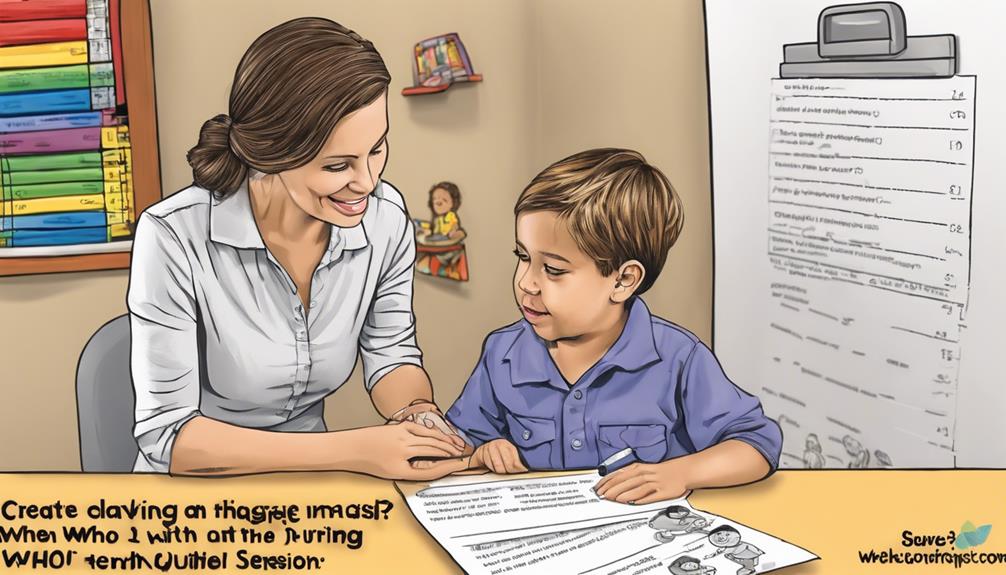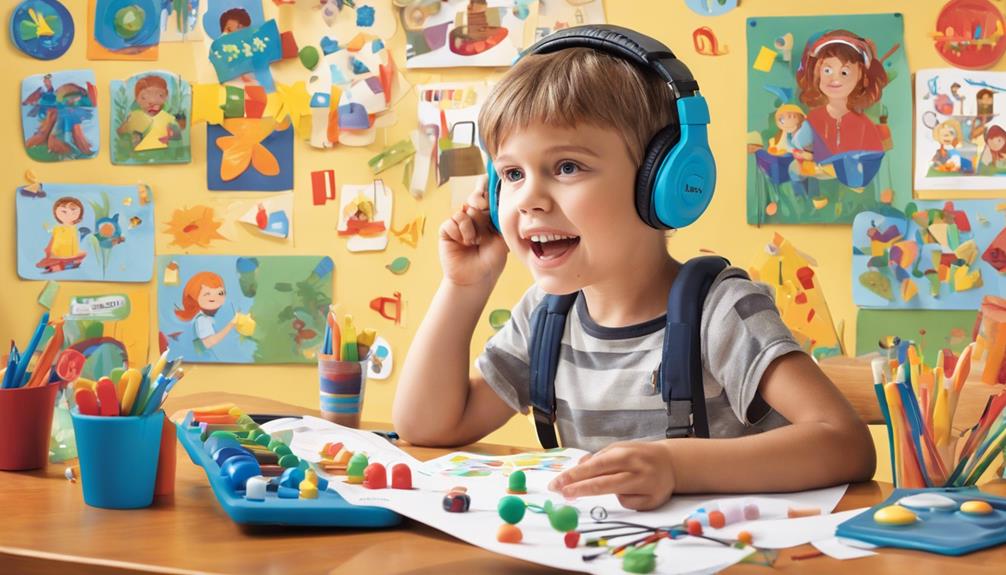As speech therapists, we comprehend the difficulties involved in teaching WH questions, but you can be confident that our comprehensive guide will make the process easier for you.
With practical strategies and engaging activities at your disposal, mastering WH questions becomes achievable for both therapists and clients.
By focusing on clear instructions and tailored exercises, this guide offers a structured approach that guarantees progress.
Join us as we explore the intricacies of teaching and assessing WH questions, unlocking the potential for improved communication skills and enhanced therapy sessions.
Key Takeaways
- WH questions are foundational for effective communication skills.
- They enhance language development and critical thinking abilities.
- WH questions play a crucial role in speech therapy for improving expression.
- Utilize activities and games to practice WH questions and enhance comprehension.

WASOCA Hearing Aids for Seniors, Hearing Aids Rechargeable with Bluetooth, Hearing Aid APP Control, Hearing Amplifier for The Hearing Loss, Hearing Your Voice, FSA&HSA Eligible
Hearing Aid & Bluetooth 2 in 1 : Hearing aids realize hearing aid and Bluetooth function 2 in...
As an affiliate, we earn on qualifying purchases.
Understanding WH Questions
Understanding WH questions is essential for effective communication and language development. As speech-language pathologists, we support individuals in honing their ability to understand and answer these questions. When working with children, we emphasize the importance of mastering WH questions as they form the foundation for meaningful interactions. By teaching children how to comprehend and respond to What, When, Where, Why, Who, Which, and How inquiries, we empower them to express themselves clearly and engage more deeply in conversations.
As professionals dedicated to serving others, we recognize that different types of WH questions serve specific purposes in communication. By progressively introducing and practicing these questions, we help individuals grasp the concept and apply it in various contexts. Mastery of WH questions not only enhances critical thinking skills but also promotes expressive language abilities. Through targeted interventions and tailored strategies, we guide individuals towards confidently navigating the complexities of WH questions, ultimately fostering their overall communication skills.

Banglijian Rechargeable Hearing Aid for Moderate to Severe Hearing Loss Ziv-206 for Seniors Adults with Noise Reduction Adaptive Feedback Cancellation-Two Types of Sound Tubes(Two Units)
EASY USE AND COMFORTABLE FEATURE: Banglijian is a professional hearing aid manufacturer and seller, which have produced a...
As an affiliate, we earn on qualifying purchases.
Importance of WH Questions
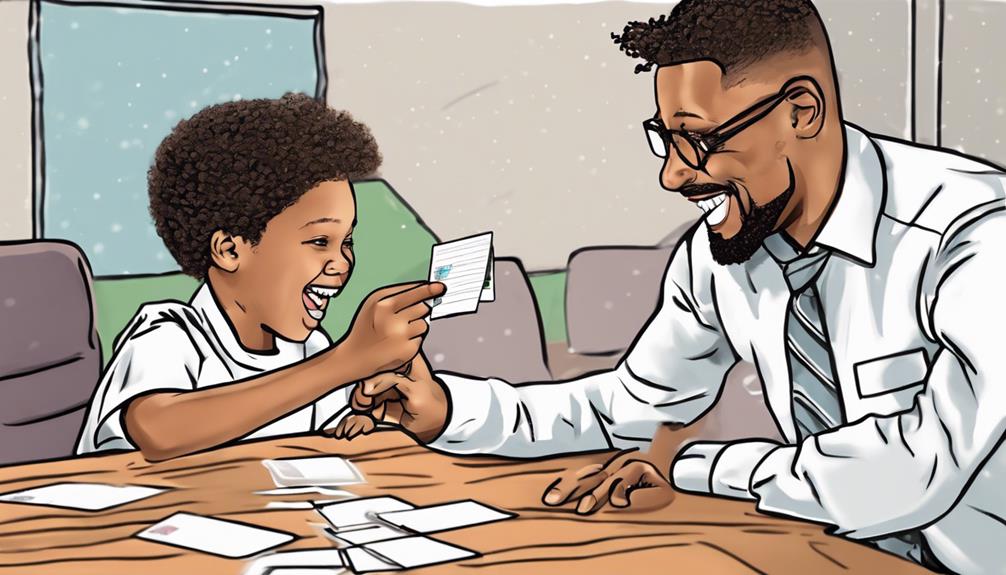
Understanding the importance of WH questions is key to unlocking effective communication skills.
These questions lay the groundwork for meaningful conversations, helping individuals express themselves and gather information.
Mastering WH questions is a fundamental step in enhancing language development and promoting critical thinking abilities.
WH Questions Basics
WH Questions serve as essential tools for enhancing communication skills and fostering meaningful interactions in speech therapy sessions. Teaching WH questions is crucial in helping individuals express themselves effectively. Answering 'wh questions encourages active participation and comprehension. Here are four key points highlighting the importance of WH questions:
- Gathering Information: WH questions are essential for acquiring knowledge and understanding others' perspectives.
- Expressing Desires: They enable individuals to communicate their needs, wants, and feelings clearly.
- Language Development: Mastery of WH questions is a significant milestone in children's linguistic growth.
- Critical Thinking: WH questions promote analytical thinking, problem-solving, and deeper understanding in various contexts.
Enhancing Communication Skills
Transitioning from the foundational understanding of WH questions, we now explore how these inquiries play a vital role in honing communication skills within speech therapy sessions. Mastering WH questions is crucial for enhancing communication skills and fostering language development. By grasping the art of asking and answering WH questions, individuals can improve their ability to express thoughts, understand information, and engage in meaningful conversations. Proficiency in WH questions is a key milestone in advancing overall communication skills, enabling individuals to navigate social interactions with confidence. Through targeted practice in speech therapy, individuals can sharpen their WH questioning abilities, leading to more effective communication and improved quality of interactions. Below is a table highlighting the importance of WH questions in communication skills development:
| Importance of WH Questions in Communication Skills |
|---|
| Promotes Language Development |
| Enhances Comprehension |
| Improves Expression of Thoughts and Ideas |
| Facilitates Meaningful Conversations |

Soundure Hearing Aids for Seniors, OTC Hearing Aids for People with severe Hearing Loss, Smart Noise Reduction Chips, Stand for 80h, One-Button Operation, Comfortable Wearing
Clearer Conversations in Daily Life: These hearing aids use digital noise reduction technology to make voices sound clearer...
As an affiliate, we earn on qualifying purchases.
Teaching WH Questions
In teaching WH questions, we focus on laying a strong foundation with concrete concepts like 'what,' 'where,' and 'who'. Here are some key strategies to help teach your child how to understand and answer WH questions effectively:
- Start with Concrete Concepts: Begin by introducing basic WH questions like 'what,' 'where,' and 'who' to help your child grasp the concept before moving on to more complex questions.
- Build Vocabulary and Comprehension: Ensure your child has a vocabulary of at least 50 words and can understand and respond to yes/no questions before introducing WH questions.
- Encourage Communication: Promote verbal or gestural communication, reduce echolalia, and make learning interactive by connecting questions to your child's interests.
- Monitor Progress and Practice: Keep track of your child's progress, adjust teaching strategies as needed, and practice WH questions in various contexts to enhance independent thinking and problem-solving skills.
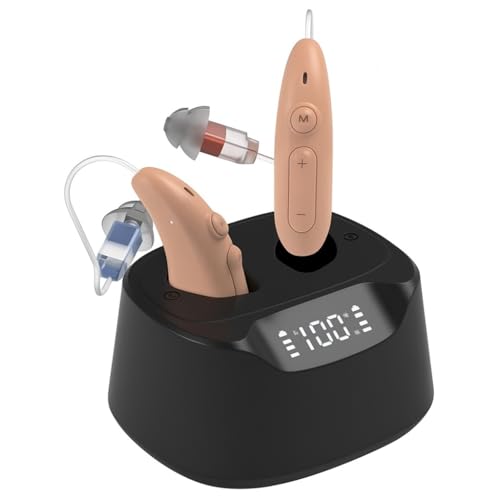
B501 Professional Hearing Aids for Severe Hearing Loss Seniors- 45dB Gain & 16-Channel Precision, Anti-Whistling Tech, 50H Battery with Charging Case, Self-Fitting Discreet Design
45dB Broadband Response for Severe Hearing Loss. Customized gain amplification up to 45dB covers even profound hearing loss,...
As an affiliate, we earn on qualifying purchases.
Assessing WH Questions Skills

Assessing a child's proficiency in understanding and responding to WH questions is a crucial step in tailoring effective speech therapy interventions. By evaluating the child's ability to answer questions like What, Where, Who, Why, When, and How, we can gain insights into their understanding of ‘Wh questions' and overall language skills.
Whether through standardized tests or informal assessments, the process helps identify areas of strength and weakness, enabling the creation of targeted intervention plans for therapy sessions. Monitoring progress over time using assessment tools and worksheets allows us to track improvements and adjust strategies accordingly.
This thorough assessment not only guides us in understanding the child's comprehension and response abilities but also plays a vital role in customizing therapy sessions to enhance their skills effectively. Through this process, we aim to support the child in mastering WH questions and improving their overall communication skills.
Discriminating WH Questions
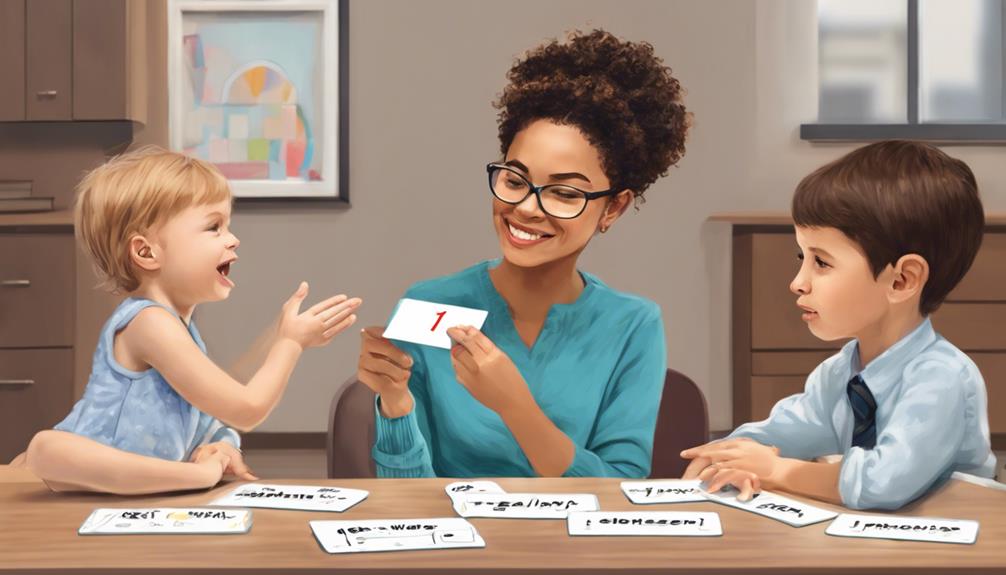
Understanding the distinctions between different WH question words is fundamental for effective communication and language development. Discriminating WH questions involves recognizing the unique characteristics and meanings of question words like What, Where, When, Who, Why, and How. Here are four key points to consider when discriminating WH questions:
- Enhancing Language Comprehension: Discrimination tasks aid in developing comprehension skills essential for understanding various types of questions.
- Fostering Critical Thinking: Discriminating between WH questions requires critical thinking to differentiate between the different question words.
- Milestone in Language Development: Mastering the ability to discriminate WH questions marks a significant milestone in language development, leading to improved language processing and understanding.
- Preparing for Higher-Level Skills: Consistent practice in discriminating between WH questions lays a strong foundation for advancing to higher-level language skills and communication abilities.
WH Questions Examples
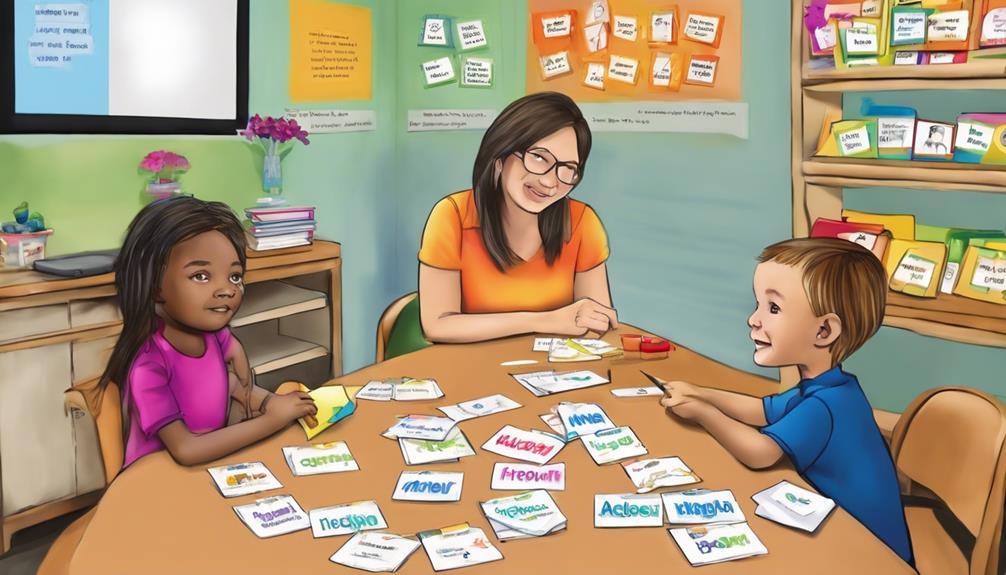
Exploring various WH question examples broadens our understanding and proficiency in communication skills. Questions starting with 'Who', 'What', 'Why', 'When', and 'How' are fundamental in conversations. Answering WH Questions can sometimes be challenging, especially when dealing with abstract concepts.
Examples like 'What is your name?' and 'Where is the park?' provide a foundation for practicing and applying WH question principles. These examples encourage active participation in dialogue and enhance comprehension.
By providing varied WH question examples, individuals can develop their skills in asking and answering questions effectively. Understanding and practicing with diverse WH question examples not only improves proficiency in communication but also boosts confidence in engaging with others.
Incorporating a range of WH question examples in speech therapy sessions can help individuals grasp the concept more thoroughly and apply it in real-life scenarios with ease.
Activities for WH Questions
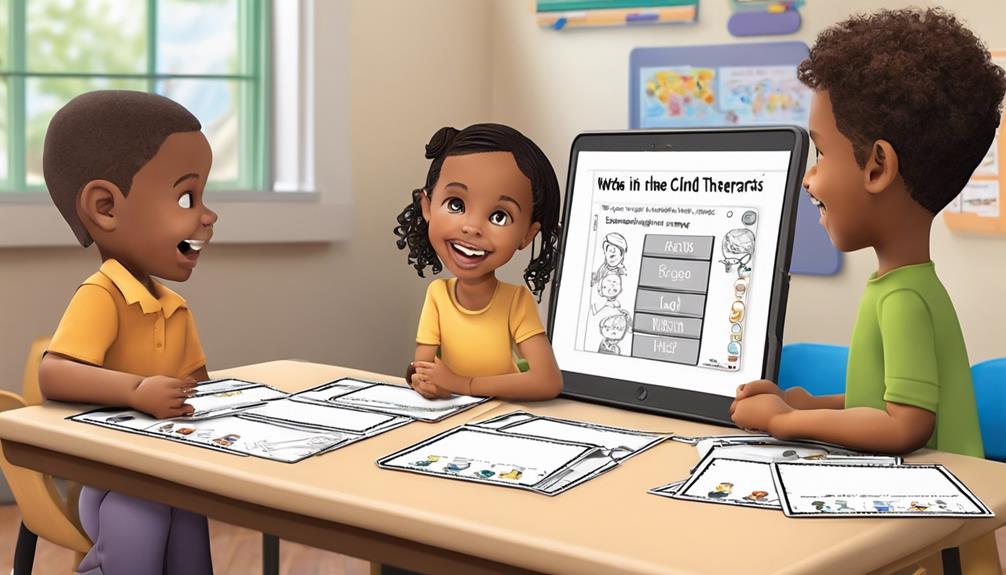
Let's explore some engaging activities to practice WH questions effectively.
From fun games to interactive worksheets and role-playing scenarios, there are various ways to reinforce these essential skills.
Fun WH Question Games
Engage in interactive WH question games like 'WH Question Bingo' to reinforce comprehension and retention of WH question concepts with enjoyable activities. Here are some fun WH question games to enhance learning:
- WH Question Card Games: Utilize card games to practice asking and answering WH questions in an entertaining way.
- WH Question Charades: Encourage physical expression and understanding of different WH question words through a game of charades.
- WH Question Treasure Hunt: Make learning WH questions exciting and interactive by organizing a treasure hunt focused on answering WH questions.
- WH Question Puzzles: Enhance problem-solving skills while mastering WH question structures with engaging puzzles.
These games aren't only enjoyable but also effective in helping children learn and comprehend WH questions.
WH Question Worksheets
To further reinforce the understanding and application of WH question concepts, incorporating WH question worksheets into speech therapy sessions offers structured practice and targeted activities for learners of all levels.
These worksheets provide a platform for pediatric speech therapy clients to answer questions related to What, Where, When, Why, Who, and How, aiding in the development of various language skills.
The activities included in these worksheets are designed to engage learners and enhance their comprehension and production of WH questions systematically. With visual support, multiple-choice options, and prompts for guidance, these worksheets offer a scaffolded approach to learning and encourage independent practice.
Role-Play WH Scenarios
Role-playing WH scenarios enables learners to actively practice responding to a variety of WH questions within realistic contexts, enhancing their comprehension and communication skills.
Benefits of Role-Play WH Scenarios:
- Interactive Learning: Engage in simulated real-life communication situations.
- Skill Enhancement: Improve social skills, critical thinking, and problem-solving abilities.
- Creativity and Flexibility: Explore different roles and scenarios to encourage creative responses.
- Active Participation: Develop hands-on skills through dynamic role-play activities.
Strategies for Mastering WH Questions

In speech therapy, effective strategies for mastering WH questions often involve utilizing visual supports to enhance understanding and engagement. When a child needs to understand the question being asked, incorporating pictures, diagrams, or videos can aid in clarifying the concepts.
By breaking down WH questions into smaller, manageable parts, it becomes easier for individuals to follow directions and grasp the information presented. Structured practice methods like role-playing, interactive games, and worksheets can reinforce WH question skills in a fun and interactive way.
Furthermore, integrating WH questions into daily routines and real-life scenarios provides practical application opportunities, promoting the generalization of skills beyond the therapy sessions. It's crucial to individualize teaching strategies based on the learner's needs, preferences, and progress to optimize the mastery of WH questions in speech therapy effectively.
Frequently Asked Questions
What Is the Hierarchy of Asking Questions in Speech Therapy?
We start with concrete WH questions like 'What' and move towards more complex ones like 'Why' and 'How' in speech therapy.
Children typically grasp concrete WH questions first before abstract ones, following a developmental sequence.
This hierarchy helps therapists target specific question types based on a child's age, language skills, and cognitive abilities.
Progressing through this sequence aids in enhancing a child's comprehension and expression of various question types effectively.
How Do You Practice Asking Questions in Speech Therapy?
Practicing asking questions in speech therapy is like sharpening a blade; it takes patience and repetition to hone the skill.
We use visual aids, real-life scenarios, and interactive activities to help us master different types of questions effectively.
With plenty of practice and feedback, we gradually improve our ability to ask questions confidently in therapy sessions.
It's all about progress, persistence, and a little bit of fun along the way.
What Are the 7 W and H Questions?
Sure!
The 7 W and H questions, which are Who, What, Where, When, Why, Which, and How, play a crucial role in communication. Each question serves a specific purpose in gathering information and promoting social interactions.
Understanding and mastering these questions is vital for language development. Practicing them helps us express ourselves clearly, seek clarification, and engage in meaningful conversations.
Mastering these questions enhances our ability to communicate effectively and understand others better.
How Do You Work on Who Questions?
When working on Who questions, we focus on identifying people in pictures or real-life scenarios. Role-playing activities and flashcards with images help strengthen understanding and verbal responses.
Engaging in social scenarios and encouraging learners to ask Who questions themselves enhances their skills. It's essential to provide varied opportunities, like practical situations and interpersonal interactions, to improve comprehension and expressive language abilities.
How Can Mastering WH Questions in Speech Therapy Help with Prompt Speech Therapy?
Mastering WH questions in speech therapy can greatly enhance prompt speech therapy benefits. By understanding and using WH questions effectively, individuals can improve their ability to communicate and express themselves more clearly and fluently. This can lead to better outcomes and progress in prompt speech therapy.
Conclusion
As we journey through the world of WH questions in speech therapy,
we discover the key to unlocking communication barriers
and building strong foundations for language development.
Like a puzzle coming together piece by piece,
mastering WH questions is a vital stepping stone
towards clearer, more effective communication.
With patience, practice, and the right tools,
we can empower individuals to express themselves confidently
and connect with others in meaningful ways.
Let's continue to explore, learn, and grow together
on this transformative path.

